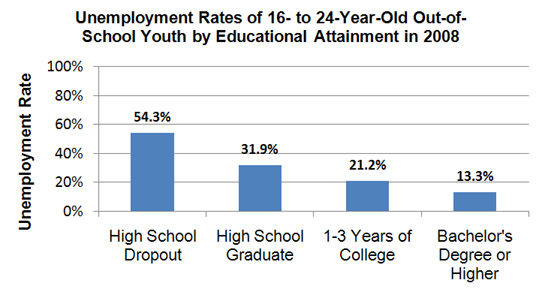The Effects of Dropping Out: A Negative Spiral

December 13, 2019
High school can be stressful, and at times, it may seem crushing. Some students have thought about dropping out at one point or another; but what are the effects of dropping out? What are the consequences?
Doe.mass.edu reports dropping out of school impacts student’s self-esteem and psychological well-being, faced with the reality that they lack skills and knowledge to fulfill their desires. Along with a lack of skills, average wages are also reported lower. Earnings for young men and women who quit school have steadily declined over the past three decades. In 1971, male dropouts earned an estimated $37,087, which decreased by 35% to $23,902 in 2002.
Along with that, the report adds unemployment rates are higher among those that dropout. In 2001, 45% of adult high school dropouts were unemployed compared to 26% of high school graduates and 13% of graduates from a four-year college. additionally, dropouts are substantially more likely to rely on public welfare and health services. All4ed.org also published findings that the national unemployment rate for high school dropouts in July 2009 was 15.4 percent, compared to 9.4 percent for high school graduates, 7.9 percent for individuals with some college credits or an associate’s degree, and 4.7 percent for individuals with a bachelor’s degree or higher. All4ed.org continues with, high school dropouts are nearly three times more likely to be unemployed than college graduates. Even when employed, high school dropouts earn about $8,000 a year less than high school graduates and approximately $26,500 a year less than college graduates.
According to the article at Doe.mass.edu, dropouts are also far more likely to get incarcerated: Dropouts are 3.5 times more likely than high school graduates to be incarcerated during their lifetime, and, Ninety percent of the 11,000 youth in detention facilities have no more than a 9th-grade education. All4ed.org suggested that the nation could save as much as $18.5 billion in annual crime costs if the high school male graduation rate increased by only 5 percentage points. In addition to the cost savings, the nation would also see a decrease in annual incidences of assault by nearly 60,000; larceny by more than 37,000; motor vehicle theft by more than 31,000; and burglaries by more than 17,000. It would also prevent nearly 1,300 murders, more than 3,800 occurrences of rape, and more than 1,500 robberies.
There are many other serious negative effects to dropping out, these are just a few, a drop in the bucket. It is highly recommended that students read the links below to get an even better idea of the negative consequences of dropping out. These are the student’s final year(s) of school, the final stretch. School can be hard at times, but dropping out makes life much harder.
http://www.doe.mass.edu/dropout/overview.html?section=consequences